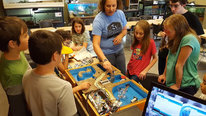- Daryl Pfeif
- https://gotdfs.com/about.html
- Founder
- STEM Integration in the Digital Forensics Science Learning Environment Grades 9-12
- https://cybersleuthlab.org/
- Digital Forensics Solutions
- Eoghan Casey
- https://gotdfs.com/about.html
- Senior Research Scientist
- STEM Integration in the Digital Forensics Science Learning Environment Grades 9-12
- https://cybersleuthlab.org/
- Digital Forensics Solutions
- Karen Peterson
- Founder and CEO
- STEM Integration in the Digital Forensics Science Learning Environment Grades 9-12
- https://cybersleuthlab.org/
- National Girls Collaborative Project
- Cassy Soden
- Web & Media Content Sr. Producer
- STEM Integration in the Digital Forensics Science Learning Environment Grades 9-12
- https://cybersleuthlab.org/
- Digital Forensics Solutions
Public Discussion
Continue the discussion of this presentation on the Multiplex. Go to Multiplex










Daryl Pfeif
Founder
Jeannie Whitlock
This is an interesting way to integrate technology into forensics. We have a group of middle school students who will be focusing on forensics. Does Cyber Sleuth Lab have activities that could be scaled down for middle school students? Have you used your program in conjunction with other forensics activities or is it primarily used as part of a computer science curriculum? I see that it could easily be integrated into either.
In regards to your question about motivating girls to learn Digital Forensics, I think the Cyber Sleuth Lab is a great way to make the learning a real world situation that truly effects their own lives. It's real.
Eoghan Casey
Senior Research Scientist
Although not part of our current program, integrating digital forensics with forensic science is one of my top priorities (https://www.nist.gov/document/osacts0002pdf). This is actually a cutting edge area, with many interesting challenges and debates that could be very interesting for students. We also recognize the benefits of reaching middle school students and we would enjoy an opportunity to discuss this with you further.
Karen Peterson
Jeannie Whitlock
David Campbell
Program Officer (retired)
The students appear to be genuinely engaged. Have you considered working with a community college to get the students college credit while they are in high school? There's a program at Prince George's community college: https://www.nationalcyberwatch.org/ ; there may be closer opportunities as well.
Carol Fletcher
Daryl Pfeif
Founder
Thank you for watching our video and for your suggestion. Two of our three pilot sites this summer will provide some form of college credit for students who participate in the program. We are actively looking to develop partnerships with community colleges and universities who specifically offer digital forensics and / or cyber security curriculum. Currently we introduce students to these specific educational pathways and related resources (like scholarship for service) through our Career Map activities, but this is informal and we are eager to form stronger linkages wherever possible. The Cyber Watch Center is a great resource, and we are open to exploring future opportunities to align with Prince George's CC and other CAE-CD institutions.
Ferda Sönmez
Hi,
I liked the way you teach, informal learning which suits to the subject. Do you ever think of doing this course remotely?
Best Regards,
Ferda
Karen Peterson
Founder and CEO
Thanks for the comment Ferda. Yes! We are hoping that once we have had successful in-classroom pilots, we will have information to make some of the modules available remotely. Facilitation is important, and as you know, creating a remote-based course takes time.
Jill Denner
This is a great video. It shows how it is possible to deeply engage students in problem solving by connecting to the things they are interested in. I look forward to seeing you take this approach to more schools and online!
Mary Murphy
Instructor
This project ticked off so many boxes for me - relevant content, active/engaged learners, high demand skills, etc. ... It gave me a clear sense of the type of learning we want students to be actively engaged with. I would love to be a student along side these students. I look forward to accessing future modules... I am wondering how much external support (training, hardware & software, materials, etc) is needed for program success? Do you have any sense of how many of the student participants have pursued career pathways related to this topic?
Daryl Pfeif
Founder
Thank you for your feedback and encouragement Mary. You are right, there is a high demand for these skills at every level. The Professional Development that supports this project also encourages teachers and facilitators to first engage with the material as Cyber Sleuths and digital citizens. We aren't in Maine yet, but would love to expand the pilot project if we are able and hope to offer remote training sessions for teachers this fall.
Because we found such a disparity in the resources within high schools across the country we purposely set up the program so that pilot sites would have very minimal hardware requirements (a computer with an internet connection). We maintain the curriculum, digital forensics software and hands on exercises in a virtual lab environment. So far, the critical components we see to program success are finding educators in high school who are willing and able to introduce this material, and providing in-depth, hands-on PD training for those teachers. Also the added classroom support of trained program facilitators is important to provide support for the teachers at our pilot sites and they also serve as near-peer role models for the students. (Many of the current facilitators are college students enrolled in Digital Forensics or Cyber Security programs near our pilot sites.) As for the longer term outcomes - we are reliant on our partners and hope to know much more in the coming years. Most of the Cyber Sleuth who have participated are still in high school, however, we already know of several participants who are finishing their senior year and actively pursuing related educational and career pathways!
Laurin Buchanan
Jacob Grohs
Assistant Professor
Thanks for sharing! It seems there are so many motivators for students in this project... the interest and shock of seeing what data is stored on one's own phone, the detective solving a mystery environment, and engaged teachers alongside. Are you able to study which of these help the program be successful or generate any best practices that might be worth considering in other contexts not just digital forensics?
Eoghan Casey
Senior Research Scientist
Thank you for the positive comments on our project and excellent question. Yes, on the basis of our collective research and experiences, we created a set of Principles of Effective Project Design and Instruction that guide our work and can be applied to other contexts. We are working on publishing this with illustrative examples from our project, but here is a quick synopsis:
Principle 1: Engage (these students will be motivated by projects they find personally relevant and meaningful)
Principle 2: Enculturate (build relationships between the students and one/more near-peer role models who can show them how a scientific culture works)
Principle 3: Immerse (these students will enjoy hands-on, open-ended projects and investigations that deal with social and ethical challenges)
Principle 4: Guide (you need to help these students gain confidence and trust in their own reasoning by encouraging them to think critically about the problems you are presenting them with)
Principle 5: Practice and Iteration (these students gain confidence and performance in response to specific, positive feedback on things they can control - such as effort, strategies, and behaviors)
Principle 6: Synthesize (these students will get the most out of the experience when you can enable them to pull together everything they learned into a solution or decision)
Principle 7: Communicate (these students benefit from collaboration, teamwork and peer learning, especially when they can participate and communicate fairly)
Principle 8: Reflect (discussing and presenting lessons learned and real world impact is critical to learning)
One of the most important things is not to underestimate the students' abilities to pick up technology quickly and deal with complex problems. In other words, this age group can deal with difficult concepts and real world scenarios. If you dumb things down too much, you will lose their interest.
It is also important to immerse and engage them using real world scenarios, getting them to use real world tools to solve challenging problems. However, the goals and contexts of any hands-on scenarios need to be age appropriate - something they can relate to in their own lives. We specifically selected scenarios of interest to girls in school, including helping grandma recover lost photos, investigating cyberbullying in school, dissemination of embarrassing photos in school, and unauthorized activities on their school account.
Last but not least, the look and feel of the materials and learning environment is also important to accessibility for these students.
We continue to learn each time we engage with students and teachers in this project, and welcome feedback and suggestions.
Laurin Buchanan
Laurin Buchanan
Great to see where you've taken the concept of digital forensic education, Eoghan! (we worked on the Alcuin SBIR with ATC-NY a number of years ago). How long is the training for teachers? Will the remote training be synchronous or asynchronous for participants?
I am working on a similar project for middle school students & cybersecurity and we are planning to have a platform for the teachers to discuss, collaborate and share what works / doesn't work with each other during the school year when they are piloting the curriculum. Do you have a similar capability, and if so, what tools are you using to support ongoing collaboration between teachers?
I'd love to learn more about the project specifics; I am on the advisory board for the cybersecurity program at a local community college that has discussed adding a forensics elective, and wants to strengthen their pipeline of candidates in high school. I'm also aware of at least one local high school that is planning to build out their cybersecurity curriculum - I think something like this could help them meet in the middle.
Carol Fletcher
So great to see cybersecurity education that is truly targeted to broadening participation. We have an official high school course in Texas called Digital Forensics and teachers have been looking for resources to teach this course for a while. We also have a brand new intro survey course called Foundations of Cybersecurity that was just approved a few months ago and there are many teachers who are interested in teaching it but looking for instructional resources. Do you have any experience incorporating Cyber Sleuth Lab into courses rather than through out of school programs? Would love to explore a partnership that brings this to Texas educators!
Daryl Pfeif
Founder
Hi Carol so glad you found us! We are actively looking for mechanisms to incorporate the Cyber Sleuth Science Lab into existing high school courses or to offer it as an elective. We would be very interested in exploring a partnership to bring this project to Texas!
Further posting is closed as the showcase has ended.